🎓 High School GPA Calculator
Calculate your weighted and unweighted GPA with precision. Track your academic performance and stay on course for college admission success.
🎯 Why Calculate Your High School GPA? Your GPA is one of the most important factors in college admissions. Whether you're aiming for Ivy League schools, state universities, or scholarship programs, knowing your GPA helps you set goals, track progress, and make informed decisions about course selection.
📊 Current GPA Information (Optional)
If you already have a calculated GPA from previous semesters, enter it here to calculate your cumulative GPA:
📝 Select Grade Input Format:
📈 Your GPA Results
Includes AP/Honors bonus
Standard 4.0 scale
Including previous GPA
Total Credits: 0
📚 Understanding High School GPA
The GPA Calculation Formula
Grade Points = Grade Value × Credit Hours × Course Weight Factor
⚖️ Weighted vs. Unweighted GPA
📘 Unweighted GPA (4.0 Scale)
Range: 0.0 to 4.0
How it works: All courses are treated equally, regardless of difficulty level.
Example: An A in AP Calculus = 4.0, same as an A in Regular Math = 4.0
Used by: Most colleges for standardized comparison across different high schools
📗 Weighted GPA (5.0 Scale)
Range: 0.0 to 5.0+
How it works: Advanced courses receive bonus points (+0.5 for Honors, +1.0 for AP/IB)
Example: An A in AP Calculus = 5.0, but an A in Regular Math = 4.0
Used by: High schools for class ranking and recognizing rigorous course loads
📊 Complete GPA Scale Tables
Standard Letter Grade Conversion
| Letter Grade | Percentage | Regular (4.0) | Honors (+0.5) | AP/IB (+1.0) |
|---|---|---|---|---|
| A+ | 97-100% | 4.0 | 4.5 | 5.0 |
| A | 93-96% | 4.0 | 4.5 | 5.0 |
| A- | 90-92% | 3.7 | 4.2 | 4.7 |
| B+ | 87-89% | 3.3 | 3.8 | 4.3 |
| B | 83-86% | 3.0 | 3.5 | 4.0 |
| B- | 80-82% | 2.7 | 3.2 | 3.7 |
| C+ | 77-79% | 2.3 | 2.8 | 3.3 |
| C | 73-76% | 2.0 | 2.5 | 3.0 |
| C- | 70-72% | 1.7 | 2.2 | 2.7 |
| D+ | 67-69% | 1.3 | 1.8 | 2.3 |
| D | 65-66% | 1.0 | 1.5 | 2.0 |
| F | Below 65% | 0.0 | 0.0 | 0.0 |
📝 How to Use This Calculator
- Choose Your Grade Format: Select either letter grades (A, B, C) or percentage grades (0-100)
- Enter Current GPA (Optional): If you have a GPA from previous semesters, enter it along with total credits completed
- Add Semesters: Click "Add Another Semester" to create semester sections
- Name Your Semester: Click the semester title to customize it (e.g., "Fall 2024")
- Add Courses: Click "Add Course" to add each class you're taking or have taken
- Enter Course Details:
- Course name (e.g., "AP Calculus AB", "Honors English 11")
- Grade received (letter or percentage)
- Credit hours (typically 0.5 or 1.0 per semester course)
- Course type (Regular, Honors, or AP/IB)
- View Results: Your weighted, unweighted, and cumulative GPAs calculate automatically!
🎯 Step-by-Step GPA Calculation Example
Sample High School Transcript Calculation
Scenario: Student taking 5 courses in Fall semester
| Course | Type | Grade | Credits | Unweighted Points | Weighted Points |
|---|---|---|---|---|---|
| AP Calculus AB | AP | A (4.0) | 1.0 | 4.0 × 1 = 4.0 | 5.0 × 1 = 5.0 |
| Honors English 11 | Honors | A- (3.7) | 1.0 | 3.7 × 1 = 3.7 | 4.2 × 1 = 4.2 |
| AP US History | AP | B+ (3.3) | 1.0 | 3.3 × 1 = 3.3 | 4.3 × 1 = 4.3 |
| Chemistry | Regular | A (4.0) | 1.0 | 4.0 × 1 = 4.0 | 4.0 × 1 = 4.0 |
| Spanish III | Regular | B (3.0) | 1.0 | 3.0 × 1 = 3.0 | 3.0 × 1 = 3.0 |
| Totals | 5.0 | 18.0 | 20.5 | ||
🎓 GPA Requirements for College Admissions
| School Tier | GPA Range (Unweighted) | Examples | Additional Requirements |
|---|---|---|---|
| Ivy League & Elite | 3.9 - 4.0 | Harvard, Yale, MIT, Stanford | Top 1-5% of class, rigorous coursework, exceptional EC's |
| Highly Selective | 3.7 - 3.9 | UCLA, UC Berkeley, Duke, Northwestern | Top 10% of class, strong test scores, leadership |
| Selective | 3.5 - 3.7 | UT Austin, UNC, Wisconsin-Madison | Top 25% of class, solid EC's and essays |
| Moderately Selective | 3.0 - 3.5 | Penn State, Indiana, Arizona State | Decent test scores, well-rounded application |
| Less Selective | 2.5 - 3.0 | State colleges, regional universities | Minimum eligibility, some holistic review |
| Open Admission | 2.0+ | Community colleges, some state schools | High school diploma or equivalent |
⚠️ Important Note: GPA requirements vary by school and program. These are general guidelines - always check specific requirements for your target colleges. Many selective schools practice holistic admissions, considering factors beyond GPA including essays, recommendations, extracurriculars, and personal circumstances.
💪 How to Raise Your High School GPA
📚 Take Challenging Courses
Enroll in AP, IB, or Honors classes. Not only do they boost your weighted GPA, but they also demonstrate academic rigor to colleges.
🎯 Focus on Core Subjects
Colleges pay special attention to grades in English, Math, Science, Social Studies, and Foreign Language. Prioritize excellence in these areas.
⏰ Start Early
Your freshman and sophomore year grades matter! It's much easier to maintain a high GPA from the start than to recover from a rough beginning.
🤝 Seek Help Early
Don't wait until you're failing. Use tutoring, office hours, study groups, and online resources at the first sign of difficulty.
📝 Master Time Management
Create a study schedule, break large projects into smaller tasks, and avoid procrastination. Consistent effort beats last-minute cramming.
💡 Extra Credit Opportunities
Take advantage of every extra credit opportunity offered by teachers. Even small boosts can make a difference in borderline grades.
📊 GPA Impact Calculator
Understanding GPA Change Over Time
Scenario: How much can you raise your GPA in one semester?
New points: 54 + (4.0 × 6) = 54 + 24 = 78 points
Total credits: 18 + 6 = 24 credits
New GPA: 78 ÷ 24 = 3.25 GPA
💡 Key Insight: The earlier you are in high school, the more impact each semester has on your cumulative GPA. This is why starting strong in freshman year is so important!
❓ Frequently Asked Questions
How do AP and Honors courses impact my GPA?
AP and IB courses typically add 1.0 point to your grade (A=5.0), while Honors courses add 0.5 points (A=4.5). This weighted calculation rewards students for taking rigorous coursework and can significantly boost your GPA.
Do colleges look at weighted or unweighted GPA?
Most colleges recalculate your GPA using their own formula. They typically focus on unweighted GPA for core academic subjects but also consider course rigor. Taking challenging courses matters even if your weighted GPA is what your school reports.
What's a good GPA for college admissions?
For competitive colleges, aim for 3.5+ (unweighted). Elite schools typically want 3.8-4.0. State universities often accept students with 3.0+. Remember: GPA is just one factor alongside test scores, essays, and extracurriculars.
How many credits is each class worth?
Most high school courses are worth 0.5 credits per semester (1.0 credits for full year). However, some schools use different systems - check with your guidance counselor to confirm your school's credit system.
Can I raise my GPA senior year?
Yes, but the impact decreases over time. With more credits already earned, it becomes harder to significantly change your cumulative GPA. However, colleges still value an upward trend and strong senior year performance.
Do electives count toward my GPA?
Yes, all graded courses typically count toward your overall GPA. However, colleges may recalculate using only core academic courses (English, Math, Science, Social Studies, Foreign Language) when making admissions decisions.
🏆 Success Strategies for High School Students
The Ultimate GPA Success Plan
- Freshman Year: Build strong study habits and aim for high grades. Your GPA foundation starts here!
- Sophomore Year: Begin taking Honors courses in subjects where you excel. Maintain or improve your GPA.
- Junior Year: Take AP/IB courses strategically. This is the most important year for college admissions!
- Senior Year: Continue challenging yourself while maintaining strong performance. Don't let "senioritis" ruin your hard work.
- Throughout High School:
- Calculate your GPA each semester to track progress
- Meet with your guidance counselor regularly
- Balance course rigor with realistic workload
- Prioritize learning over just grades
- Build relationships with teachers who can write recommendations
🌟 Remember: While GPA is crucial for college admissions, it's not everything. Develop your interests, pursue meaningful extracurriculars, build strong relationships, and take care of your mental health. Colleges want well-rounded students who will contribute to their campus community, not just high test scores and GPAs.
1. Select your grade format
You can select your current grade format – letter grade or percentage grade to figure out your GPA. Request your teacher to provide your grade before the final report card. You can estimate the grades in case your teacher can’t confirm the grades. Letter grades can range from A+ to an F on the 4.0 Scale.
Percent grades range from 100% to 60%. Anything under 59% or lower is considered as F (fail).
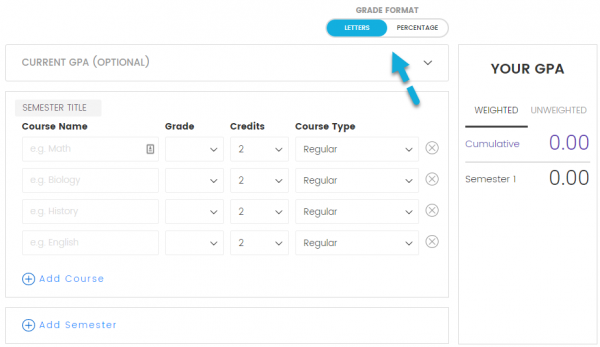
2. Enter Your Current GPA (Optional)
Enter your current GPA and total credits you have taken, and the calculator will start calculating your high school GPA by factoring in your current GPA. This step is optional, and you can choose not to enter any data here.
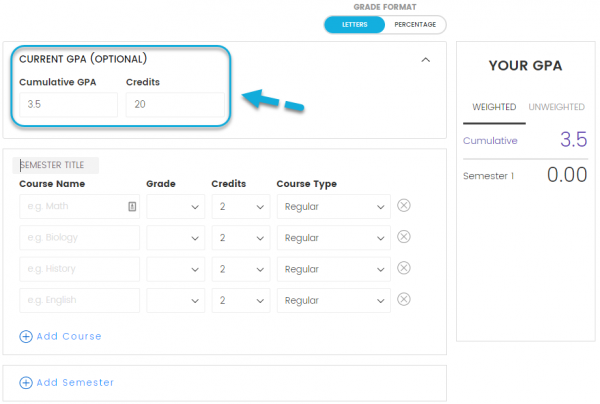
3. Customize your semester name (Optional)
You can customize the semester name to make it easy to remember.
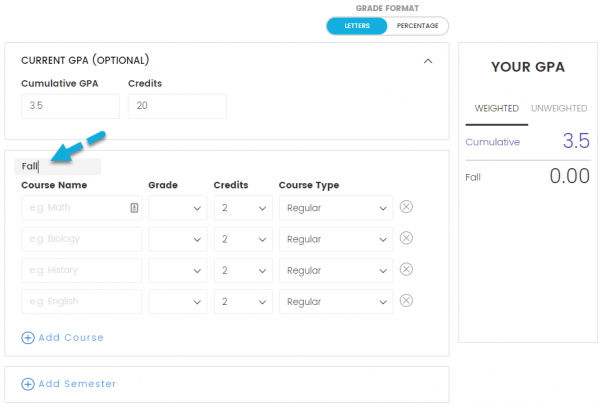
4. Add all courses to calculate your high school GPA
You can add your courses in this format:
- Course Name
- Grade (Letter or Percent grade)
- Credits (Leave it as 1 if not known)
- Course Type (Regular, AP, Honors etc.)
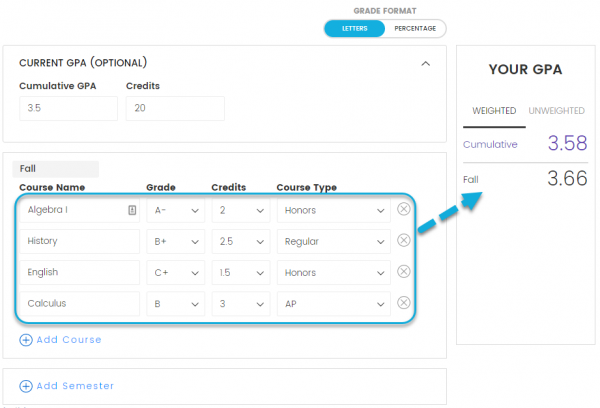
Regular classes will be given points according to the standard scale (A = 4, B = 3, C = 2). For Honors, grades will be increased by half a point. Grades for College / Advanced Placements / IB courses will be increased by a whole point. GPA will be updated and adjusted as you enter class and subject weight, and shown under ‘Your GPA’ section as both weighted GPA and unweighted GPA.
- Weighted GPA – factors in course credits and course type weightings
- Unweighted GPA – ignores course credits and course type weightings
Click “Add course” button to add more courses.
5. Add a semester
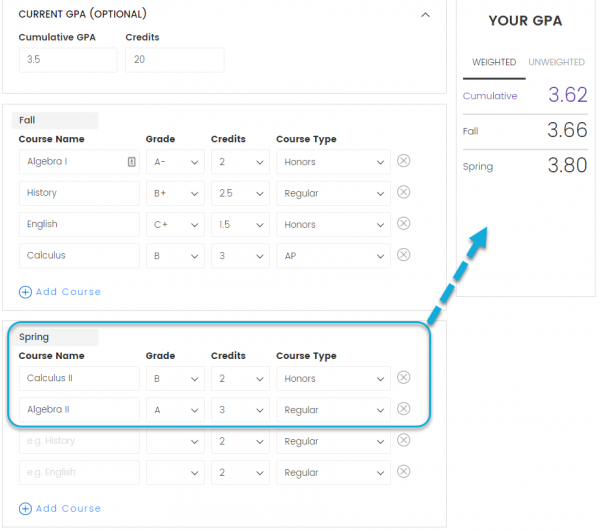
Click on “Add semester” and follow step 2, 3 and 4 to enter your course grades. Each semester GPA will show up on the right side under ‘Your GPA’ section.
How Do I Calculate My AP/Honors High School GPA?
Calculating a weighted high school GPA involves accounting for the increased difficulty of Advanced Placement (AP) and Honors courses. Follow these steps to determine your weighted GPA:
List Your Courses and Grades:
- Compile a list of all your current courses along with the grades you’ve received in each.
Assign Point Values:
- Regular Courses:
- A = 4 points
- B = 3 points
- C = 2 points
- D = 1 point
- F = 0 points
- AP/Honors Courses:
- A = 5 points
- B = 4 points
- C = 3 points
- D = 2 points
- F = 0 points
- Regular Courses:
Total the Points:
- Add up all the points from your grades.
Count Your Courses:
- Determine the total number of courses on your list.
Calculate GPA:
- Divide the total points by the number of courses to find your weighted GPA.
How Do AP and Honors Courses Impact My Overall GPA?
AP and Honors courses can significantly boost your GPA due to their weighted point values. Here’s how they compare to regular courses:
| Grade | Regular Courses | AP/Honors Courses |
|---|---|---|
| A | 4 | 5 |
| B | 3 | 4 |
| C | 2 | 3 |
| D | 1 | 2 |
| F | 0 | 0 |
Taking challenging AP and Honors courses not only enhances your GPA but also strengthens your class ranking and college applications by demonstrating your willingness to tackle rigorous coursework.
How Many AP and Honors Courses Should I Take?
Deciding the number of AP and Honors courses to enroll in depends on several factors:
- Time Management: Balancing extracurricular activities, sports, or part-time jobs can limit the number of demanding classes you can handle.
- Learning Style: AP and Honors courses are typically faster-paced and more challenging than regular classes.
- Academic Goals: Consider your college aspirations and the competitiveness of the programs you’re interested in.
- Consultation: Speak with your school counselor and peers who have taken these courses to determine what’s manageable for you.
What Score Do I Need on My Final Exam?
Final exam weight varies by school, typically contributing 10% to 20% of your overall course grade. To achieve the highest possible course grade:
- Understand the Weight: Know the exact percentage your final exam counts toward your grade.
- Aim High: Strive for a high score to maximize your course grade.
- Use Tools: Utilize our Final Grade Calculator to estimate your potential final course grade based on your current standing and desired outcome.
What Is a Good GPA in High School?
A “good” GPA depends on your academic and career goals:
- Valedictorian/Salutatorian: Aim for a weighted GPA of 4.0 or higher.
- Honor Graduation: Target a GPA of around 3.5 or higher.
- College Admission and Scholarships: Strive for a GPA of 3.0 or higher, as many colleges have minimum GPA requirements.
Is a 4.0 Weighted GPA Good?
Yes, a weighted GPA of 4.0 is excellent and typically qualifies you for Honor Graduate status, reflecting outstanding academic achievement.
What Is the Highest High School GPA?
- Standard GPA Scale: The highest GPA is 4.0.
- Weighted GPA Scale: Some schools use a weighted scale that can go up to 5.0 or higher, allowing for higher GPAs through AP and Honors courses.
How Important Is High School GPA for College?
High school GPA is a critical component of college admissions. It:
- Meets Minimum Requirements: Most colleges have minimum GPA thresholds for admission.
- Determines Scholarships: Many scholarships require a specific GPA for eligibility.
- Reflects Academic Ability: Indicates your readiness for college-level work.
How to Raise Your GPA After High School Graduation?
Unfortunately, you cannot raise your high school GPA after graduation. However, you can focus on excelling in college to build a strong academic record.
Are Pass/Fail Courses Included in My GPA?
No, Pass/Fail (P/F) or Pass/No Pass (P/NP) courses do not affect your GPA. They are excluded from GPA calculations.
Do Incompletes (I) and Withdrawals (W) Affect My GPA?
No, grades marked as Incomplete (I) or Withdrawals (W) do not impact your GPA since these courses do not receive grade points or credit hours.
What Is a Good High School GPA?
Aiming for a GPA of 3.3 or higher is advisable, especially if you plan to attend college. Top-tier schools, including Ivy League institutions, generally require a minimum GPA of 3.3.
Planning Tip: Check the GPA acceptance scores of colleges you’re interested in to ensure you meet their requirements.
How Can I Calculate My Grades Within a Specific Course?
Use our Grade Calculator to input your assignment scores and determine your current course grade. Alternatively, follow these steps manually:
- Convert Grades to Points:
- Refer to the grading scale below.
- Add the Points:
- Sum all the numerical values of your grades.
- Calculate the Average:
- Divide the total points by the number of assignments.
How Do My AP and Honors Courses Affect My Overall GPA?
AP and Honors courses are typically weighted to reflect their increased difficulty. Generally:
- Honors Courses: Add 0.5 points (e.g., A = 4.5).
- AP Courses: Add 1.0 point (e.g., A = 5.0).
Note: Grading scales may vary by school, so consult your school’s administration for specific policies.
How Do I Calculate a Weighted High School GPA?
Follow these steps to calculate your weighted GPA:
Convert Grades to Points:
- Regular Courses: A = 4, B = 3, C = 2, D = 1, F = 0.
- AP/Honors Courses: A = 5, B = 4, C = 3, D = 2, F = 0.
Add All Grade Points:
- Sum the points from all your courses.
Divide by Number of Courses:
- Total points ÷ number of courses = Weighted GPA.
Example:
| Course | Grade | Points |
|---|---|---|
| English | A | 4 |
| AP Biology | B | 4 |
| History | A- | 3.7 |
| Honors Math | B+ | 3.3 |
Total Points: 4 + 4 + 3.7 + 3.3 = 15
Number of Courses: 4
Weighted GPA: 15 ÷ 4 = 3.75
How Many AP and Honors Courses Should I Take?
Deciding how many AP and Honors courses to take depends on:
- Academic Capacity: Assess your ability to handle increased workload.
- Extracurricular Commitments: Balance schoolwork with activities and responsibilities.
- Passion and Strengths: Choose subjects you are passionate about and excel in.
- Recommendations: Seek teacher recommendations for AP course enrollment.
Tip: Colleges value a well-rounded student who excels in challenging courses without overextending themselves.
I Heard 9th Grade Grades Don’t Count. Is This True?
No, all grades from 9th through 12th grade contribute to your cumulative GPA. Colleges consider your entire high school academic record when evaluating your application.
When Comparing Grades, Which Is Better: An A in a Regular Class or a C in an Honors/AP/IB Class?
Colleges evaluate both the difficulty of your courses and your performance within them. Generally:
- An A in an Honors/AP/IB Class is viewed more favorably than an A in a regular class.
- A C in an Honors/AP/IB Class may raise concerns about your ability to handle challenging coursework.
Advice: Strive for high grades in the most challenging courses you can manage. Consistently earning good grades in advanced classes demonstrates both capability and commitment.
How Many Students Take Advanced Placement (AP) Classes?
Advanced Placement participation has grown significantly:
- National Enrollment: Approximately 69% of high schools reported offering AP or IB courses.
- AP Exam-Takers: In 2017, 2.7 million students took nearly 5 million AP exams.
This widespread participation underscores the importance of AP courses in enhancing college applications and academic rigor.
How Can I Improve My High School GPA Quickly?
Enhancing your GPA swiftly requires strategic actions:
Enroll in AP Classes:
- These courses can provide weighted points to boost your GPA.
Attend Summer School:
- Retake courses to replace low grades, if possible.
Maintain Regular Attendance:
- Consistent attendance helps you grasp course material better.
Invest in Study Time:
- Develop effective study habits and allocate sufficient time for studying.
Seek Assistance:
- Utilize tutoring services, seek help from teachers, and collaborate with peers.
Additional Tip: Focus on improving grades in your remaining courses to maximize your GPA before graduation.
What Are the Types of Grades?
Grades can be represented in various formats, each with corresponding values:
| Letter Grade | Percentage | 4.0 Scale |
|---|---|---|
| A+ | 97-100 | 4.0 |
| A | 93-96 | 4.0 |
| A- | 90-92 | 3.7 |
| B+ | 87-89 | 3.3 |
| B | 83-86 | 3.0 |
| B- | 80-82 | 2.7 |
| C+ | 77-79 | 2.3 |
| C | 73-76 | 2.0 |
| C- | 70-72 | 1.7 |
| D+ | 67-69 | 1.3 |
| D | 65-66 | 1.0 |
| E/F | Below 65 | 0.0 |
Additional Grade Types:
- P: Pass
- S: Satisfactory
- U: Unsatisfactory
- W: Withdrew
- I: Incomplete
- R: Repeat
- F: Fail
- *: No grade available
How Do I Calculate My High School GPA?
Your high school GPA is a numerical representation of your academic performance. Here’s how to calculate it:
Unweighted GPA Calculation:
Convert Letter Grades to Points:
Letter Grade Points A+ / A 4.0 A- 3.7
| B+ | 3.3 | | B | 3.0 | | B- | 2.7 | | C+ | 2.3 | | C | 2.0 | | C- | 1.7 | | D+ | 1.3 | | D | 1.0 | | D- | 0.7 | | F | 0.0 |
Add the Points:
- Example: A (4.0) + B- (2.7) + B+ (3.3) + A (4.0) = 14.0 points
Divide by Number of Classes:
- Example: 14.0 points ÷ 4 classes = 3.5 GPA
Weighted GPA Calculation:
Convert Letter Grades with Weight:
Course Type A B C D F
| AP Classes | 5.0 | 4.0 | 3.0 | 2.0 | 0.0 | | Honors Classes | 4.5 | 3.5 | 2.5 | 1.5 | 0.0 | | Regular Classes | 4.0 | 3.0 | 2.0 | 1.0 | 0.0 |
Add All Grade Points:
- Example:
- English (A) = 4.0
- AP Biology (B) = 4.0
- History (A-) = 3.7
- Honors Math (B+) = 3.3
- Total Points: 4.0 + 4.0 + 3.7 + 3.3 = 14.0 points
- Example:
Divide by Number of Courses:
- Example: 14.0 points ÷ 4 courses = 3.5 Weighted GPA
Note: Use our GPA Calculator for quick and accurate GPA calculations.
Can a Low GPA Affect My Academic Standing or Future Opportunities?
Yes, a low GPA can have several negative impacts:
- Scholarship Eligibility: Many scholarships have minimum GPA requirements.
- College Admissions: A low GPA may reduce your chances of being admitted to competitive colleges.
- Job Opportunities: Some employers consider GPA as part of their hiring criteria, especially for entry-level positions.
- Academic Standing: Maintaining a minimum GPA is often required to stay in good academic standing and avoid probation.
Action Steps: Monitor your GPA regularly, seek academic support when needed, and focus on improving your grades to mitigate these impacts.
Semester GPA vs. Quarter GPA – What Is the Main Difference?
The primary difference between semester GPA and quarter GPA lies in the length of the academic term they cover:
Semester GPA:
- Based on grades received during a single semester (typically 15 weeks).
- Calculates the average of all course grades for that semester.
Quarter GPA:
- Based on grades received during a single quarter (typically 10 weeks).
- Calculates the average of all course grades for that quarter.
Key Point: A semester GPA often provides a more comprehensive assessment of a student’s performance over a longer period compared to a quarter GPA.
How Much Does High School GPA Weigh in the College Admissions Process?
The weight given to your high school GPA varies among colleges:
- Significant Emphasis: Many colleges consider GPA as a critical indicator of your academic abilities and readiness for college-level work.
- Holistic Approach: Some institutions use a holistic admissions process, balancing GPA with standardized test scores, extracurricular activities, essays, and recommendation letters.
Advice: Research each college’s specific admissions criteria to understand how they prioritize GPA in their evaluation process.
Can a Low GPA Ruin My Chances of Getting Into a Good College?
A low GPA can present challenges, but it does not necessarily ruin your chances:
- Holistic Review: Many colleges evaluate applications holistically, considering factors beyond GPA such as extracurricular involvement, leadership roles, community service, and personal statements.
- Improvement Over Time: Demonstrating academic improvement in later years can positively influence admissions decisions.
- Unique Strengths: Highlighting unique talents, skills, and experiences can offset a lower GPA.
Strategy: Focus on strengthening other aspects of your application to enhance your overall profile.
Can a High GPA Guarantee College Acceptance?
While a high GPA enhances your application, it does not guarantee acceptance:
- Multiple Factors: Colleges assess various elements including standardized test scores, extracurricular activities, essays, and recommendation letters.
- Competition: Highly competitive colleges receive applications from many qualified candidates, making admissions decisions based on a combination of factors.
- Fit: Admissions committees also consider how well your goals and interests align with the institution’s programs and values.
Conclusion: Maintain a high GPA, but also invest time in other areas of your application to increase your chances of acceptance.
Is GPA More Important Than Standardized Test Scores for College Admissions?
The importance of GPA versus standardized test scores varies by institution:
- Some Colleges Prioritize GPA: Viewing it as a consistent measure of academic performance.
- Others Value Test Scores: Considering them as a standardized metric to compare students from diverse educational backgrounds.
- Balanced Approach: Many colleges use both GPA and test scores as part of a comprehensive admissions review.
Recommendation: Understand each college’s admissions criteria to prioritize accordingly and aim for a balanced academic profile.

